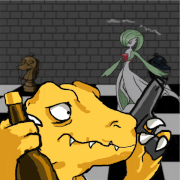|
Yeah the ideas behind it get written a lot about by miyamoto musashi in his book of five rings, and later on in the hagakure by some other guy. I'm not an expert but you can pretty easily see how the philosophy was influence by zen buddhism and the lack of real conflict. https://youtu.be/lgV7t-TY2o8 This extremely well researched and academic video should help
|
|
|
|

|
| # ? May 11, 2024 20:17 |
|
FAUXTON posted:not if you're just following the imperial family lol Honestly the Imperial Family during the Sengoku era is fun to read about due to Kyoto burning down and being sacked early in the era. My favorite factoid was that at one point the Emperor was reduced to selling calligraphy in the streets because every other thing they could sell had already been stolen, so for a few dozen ryo you too could get your family mon drawn by the literal emperor of Japan. Not sure what the rest of the Kuge aristocracy was doing but presumably not much better, even as they looked down on the samurai as mere uncultured country bumpkins.
|
|
|
|
Elyv posted:Finding a narrative throughline for the entire Sengoku Period seems hard. Pre-Nara: wet-rice agriculturalist settlers from mainland Korea and China push the Jomon/Emishi natives of Japan to the east and north Nara-Heian period: This society models itself after Imperial China emerges. However, they could never fully implement Chinese style bureaucracies, the pressures of dealing with the Jomon/Emishi causes power to devolve to a newly emergent warrior class, who gained the right to prosecute private wars amongst themselves. Kamakura-Ashikaga period: The Imperial court steadily weakens, and functionally collapses when it enters a civil war over a succession dispute. Samurai intervention turns the winning Emperor into a puppet, the Kamakura shoguns now re-establishes central control over the provinces, appointing military governors. The pressures of the Mongol invasion causes the Kamakura shogunate to collapse, and are supplanted by the Ashikaga shoguns, who allow power to devolve further to the provinces. Then the Ashikaga shogun collapses in a succession dispute, and central control disappears from either the Shogun or Emperor, spinning off dozens and hundreds of petty kingdoms ruled by a combination of military governors and the governor's land managers and so on. Sengoku period: all these daimyos now have no authority to stop them from prosecuting private wars, some families are better at it than others, and they grow and consolidate their petty kingdoms. But this isn't a civil war that leads to demographic collapse, it's no 30YW, the population of Japan steadily rises: wet rice agriculture is extremely land efficient. The mountainous forests provide copious lumber. Ming China has no interest in intervention, the Europeans had yet to really arrive on the scene. In the end, a succession of 3 lords attained pre-eminence, Nobunaga, Hideyoshi, and Tokugawa. Nobunaga who showed it was fully possible to unite the lands. Hideoyoshi was less secure, to secure his position he dangled the promise of conquering Korea to his lords, who then used their veteran armies to tear a swathe through Korea and pressure the Ming Dynasty into collapse. Tokugawa established a stable several centuries system of power that both bound lords to his control and still allowed them to govern their domains. The fact that the Sengoku could even end at that point is probably a reason why Japan wasn't colonized like SE Asia, nor partitioned like China, the Spanish/Dutch/English colonial empires had easier prizes closer at hand. By the time the Americans could threaten them from the East, central authority was well established, there was little chance of disintegrating into a second Sengoku.
|
|
|
|
Phobophilia posted:The samurai caste was very fluid during the sengoku: when you live in the crucible of constant war, a lord isn't going to be picky about the heritages of your retainers so long as they're really good at fighting and leading men. Hideyoshi started out as a servant. There's a letter from a lord to his son admonishing him to not waste money on one fine sword, when you could equip hundreds of men with spears for the same expenditure. This is overstating it a bit. It definitely wasn't so rigidly enforced as later on, but it's not like they didn't care; Hideyoshi faced a lot of resistance because of his birth. Edgar Allen Ho posted:I mean, basically all of "bushido" is post-meiji isn't it? And mostly from the fascist period where the people whose ancestors were actual samurai conned all the poor schmucks to kill and die for The Nation Grand Fromage posted:Yup. It's harder than you'd think to find any "traditional" Japanese culture that actually pre-dates Meiji. At least on a national level; there are lots of little village festivals and stuff that are centuries old. The same way a lot of western countries invented a romantic traditional past in the 19th century, Japan adopted that as part of their modernization too. Food culture wise a surprising amount is post WW2. In the case of Bushido it was more the formalization of what had been a disparate set of ideals into something codified. It's not like it got pulled wholesale out of someone's rear end; these ideals were still the kinds of things Samurai valued (even if they didn't follow them) pre-Edo, but it got romanticized in Edo and even more strongly in Meiji. Shinto is kind of the same deal; sometimes you read it was "invented" in the Meiji, but what that means isn't that someone sat in a room and made it all up (mostly anyway), so much as it was a unification of what had been a heterogeneous set of genuine but local regional traditions / beliefs into a single national national religion. Someone from Shikoku and someone from Kanto might not have thought their traditions had much in common, but they still existed. Nessus posted:Yeah my understanding is that the art of the Japanese sword was mostly amazing for making serviceable swords out of iron ore that would have probably been used as paving stones in other countries, not that the swords were, in fact, monomolecular. I don't know too much about the metallurgy but I've read the "Japanese pig iron" thing gets overplayed; refining the iron from iron sands (the main source of it on the archipelago) is a slightly more annoying process but apparently once you get it done the iron is just as good as anywhere else. Japanese swords obviously had a range of quality, just like everywhere, but the good ones were actually valued internationally even pre-Weeb. Even pre-Imjin War, katana-style as well as straight up Japanese imports were popular in Joseon Korea, and iirc the same is true in China. They were artistically popular in Europe from the 17th century, too. A 16th century Korean account mentions that the Japanese were apparently even at that point "famous for" having individual artisans dedicate themselves to mastering ridiculously specific things--from the Korean perspective, generalism was better--so I'm kinda inclined to believe that for high status individuals anyway, weaponmaking as an art form (which it very consciously was not in China or Korea) has some deeper roots, even if the Edo traditions of every individual part of the sword being made by a separate master craftsman was a later thing. IMO premodern Japanese history gets strongly overblown, but some of the anti-weeb stuff still gets taken to extremes a bit. Koramei fucked around with this message at 00:04 on Mar 6, 2021 |
|
|
|
FreudianSlippers posted:Similarly viking swords were largely made from bog iron and weren't very good by continental standards. Isn't there a mythbuster episode where they test some swords and one of them gets all bent?
|
|
|
|
Koramei posted:In the case of Bushido it was more the formalization of what had been a disparate set of ideals into something codified. It's not like it got pulled wholesale out of someone's rear end; these ideals were still the kinds of things Samurai valued (even if they didn't follow them) pre-Edo, but it got romanticized in Edo and even more strongly in Meiji. My understanding is bushido is like chivalry. It is based on actual things from the time but the form we think of is a mostly modern invention. Like the emphasis on loyalty is extremely funny when you read any samurai history.
|
|
|
Koramei posted:IMO premodern Japanese history gets strongly overblown, but some of the anti-weeb stuff still gets taken to extremes a bit. Grand Fromage posted:My understanding is bushido is like chivalry. It is based on actual things from the time but the form we think of is a mostly modern invention.
|
|
|
|
|
The main reason that Japanese nationalist myths get spread around the rest of the world so much is probably because the entire nation was occupied following WWII, plus pre-WWI it was a hot area for scholars to go and then completely misunderstand what the local culture was. A lot of other nations have romanticized their own history to an insane degree but most people aren't as up to speed on, say, Korean or Thai nationalist myths except for when you see jokes about the HWAN EMPIRE founding all culture, or maybe that time the Thai king (Naresuan) supposedly killed a Burmese prince by challenging his counterpart to honorable 1v1 war elephant duel.
|
|
|
|
Phobophilia posted:Bushido was post-Tokugawa, it just got rrevived by the post-Meiji Imperial Japanese Army to motivate its conscripts. Bushido was originally an elite philosophy, not any farmer pulled out of his hut and given a gun and uniform was supposed to embody it. But you can't discount its effectiveness, those soldiers allowed Imperial Japan to punch far above its weight. to be fair I think it was their naval capabilities, with well-prepared defenses running second.
|
|
|
|
Grand Fromage posted:Like the emphasis on loyalty is extremely funny when you read any samurai history. I've yet to learn about a feudal system anywhere in the world that didn't 1: Hold loyalty as it's highest most important virtue. 2: Consist of the least loyal backstabbers possible. This makes me start to doubt Feudalism is actually the best form of society, but then I remember all the cool armor and swords and my faith is restored.
|
|
|
|
galagazombie posted:I've yet to learn about a feudal system anywhere in the world that didn't Feudalism is... bad?  Anyway look at these cicada gladiators: 
|
|
|
Don Gato posted:maybe that time the Thai king (Naresuan) supposedly killed a Burmese prince by challenging his counterpart to honorable 1v1 war elephant duel.
|
|
|
|
|
FreudianSlippers posted:Similarly viking swords were largely made from bog iron and weren't very good by continental standards. Swords (and chef's knives) definitely get bent surprisingly easily, and stomping on them is a common remedy.
|
|
|
|
galagazombie posted:I've yet to learn about a feudal system anywhere in the world that didn't I mean there's a lot of confirmation bias in that, I'm sure there's a ton of Samurai who were totally loyal, we just don't remember their names. Whereas a guy like Akechi Mitsuhide makes one mistake and suddenly everyone remembers him.
|
|
|
|
Klingons are the same way.
|
|
|
|
There's also a perverse logic to it: they tell stories about loyalty and honor and value them highly because they're scarce. It you could take it for granted they wouldn't bother.
|
|
|
|
Yeah it's basically the same as organized crime, they value loyalty because they rat each other out the moment they're caught. What little I know about samurai comes from a couple books by Conlan and he mentions that for warriors fighting in the 13h century civil wars it was all about getting paid for service. You show up to a battle, gotta get paid. You actually fight in a battle, gotta get paid. Your horse gets hurt in the battle, you better believe the lord you're fighting for is going to hear about it. There's a reason why they have huge ceremonies where you show off the severed heads of the guys you've killed, those heads are basically invoices for services rendered.
|
|
|
|
it's no surprise that a societal structure entirely based around sorting people into strict hierarchies from the moment they're born would have adherence to the people above you in the chain, even to your own detriment, as one of its primary social virtues
|
|
|
|
Chamale posted:Swords (and chef's knives) definitely get bent surprisingly easily, and stomping on them is a common remedy. I really wish I could hang out with the roman line cooks from places like the quick service joints excavated in Pompeii. I feel like we'd have more in common than differences. poo poo, between bad high school latin, french, and universal cook gestures we could probably talk pretty well.
|
|
|
|
Edgar Allen Ho posted:I really wish I could hang out with the roman line cooks from places like the quick service joints excavated in Pompeii. I feel like we'd have more in common than differences. poo poo, between bad high school latin, french, and universal cook gestures we could probably talk pretty well. how would i say "Sharp! Behind!" or "Hot! Behind!" in latin.
|
|
|
|
Nessus posted:It seems like a political project pretty much literally the same as every other modern-era national identity being constructed, it just was romantic and mythical because of poor access to texts. Ehh I donít think thatís fair, theyíre all romantic and mythical. Itís a response to broken national origin myth (broken by modernity). Revolutionary romantics construct incoherent replacement narratives. They arenít incoherent because of lack of information or access to texts. Theyíre incoherent because they are replacing a myth of origin that became incoherent and inconsistent with the reality of living in the nation.
|
|
|
|
Nessus posted:That's a story that needs to be true, even if it's not. Is there more context to it? The historical context is that at the time of his reign, Naresuan was fighting to break what is now Thailand from vassalage of the Touangoo Empire based in what's now Burma/Myanmar. The historical reality is that he crushed a Touangoo army led by the Touangoo heir apparent near Ban Khoi, and since it's SE Asia everyone had elephants. The Thai claim that he singled out prince Mingyi Swa and challenged him into elephant combat, and that when Naresuan was victorious the enemy army was forced to retreat. Contemporary Burmese sources claim that Mingyi Swa was sniped by a Thai mortar, but I prefer to believe the version that involves epic elephant fights. Generally speaking, if you see a statue of a man riding a heavily armed war elephant in Thailand, it's King Naresuan; plus there's a 5 part movie series on his life, and the TV series, and the other older series, and the animated movies, and basically he is like the Thai version of the 3 kingdoms but with more elephants.  Here's a sculpture in Thailand that they claim is 100% historically accurate.
|
|
|
|
CommissarMega posted:I remember reading in this thread that the ancient Assyrians were massive assholes, but looking back through a bazillion pages for Assyrian stuff seems to be a job for actual archaeologists. Could I have the CliffNotes on their history, or at least a few YouTube videos I can listen to while I play Civ?  Basically this
|
|
|
|
Don Gato posted:The historical context is that at the time of his reign, Naresuan was fighting to break what is now Thailand from vassalage of the Touangoo Empire based in what's now Burma/Myanmar. The historical reality is that he crushed a Touangoo army led by the Touangoo heir apparent near Ban Khoi, and since it's SE Asia everyone had elephants. The Thai claim that he singled out prince Mingyi Swa and challenged him into elephant combat, and that when Naresuan was victorious the enemy army was forced to retreat. Contemporary Burmese sources claim that Mingyi Swa was sniped by a Thai mortar, but I prefer to believe the version that involves epic elephant fights. Generally speaking, if you see a statue of a man riding a heavily armed war elephant in Thailand, it's King Naresuan; plus there's a 5 part movie series on his life, and the TV series, and the other older series, and the animated movies, and basically he is like the Thai version of the 3 kingdoms but with more elephants. what century did all this go down?
|
|
|
|
Don Gato posted:Honestly the Imperial Family during the Sengoku era is fun to read about due to Kyoto burning down and being sacked early in the era. My favorite factoid was that at one point the Emperor was reduced to selling calligraphy in the streets because every other thing they could sell had already been stolen, so for a few dozen ryo you too could get your family mon drawn by the literal emperor of Japan. Not sure what the rest of the Kuge aristocracy was doing but presumably not much better, even as they looked down on the samurai as mere uncultured country bumpkins. I do remember hearing that when Europeans finally got to have a good look around Japan, they initially took the shogun for a king and the emperor for a pope. (and that frankly might be doing a disservice to the pope) Stable central rule seems one of the most key things to resisting colonialism, I get the idea that China wasn't able to avoid European predation at least in part because of decentralised control and the difficulty of getting any real information in and out of the Forbidden City, where emperors had to basically establish their own dedicated spy corps to get reliable information that wasn't just what people thought the emperor (or dowager) would want to hear.
|
|
|
Bar Ran Dun posted:Ehh I donít think thatís fair, theyíre all romantic and mythical. Itís a response to broken national origin myth (broken by modernity). Revolutionary romantics construct incoherent replacement narratives. They arenít incoherent because of lack of information or access to texts. Theyíre incoherent because they are replacing a myth of origin that became incoherent and inconsistent with the reality of living in the nation. I also think we're talking about different things, I'm talking about the political project to make various territories which may have some things in common other than adjacency into, like, A Nation. To paraphrase a bit from upthread: the guy in Kanto might not see himself as being in the same "society" as the guy in Shikoku even if nowadays we would say "obviously you are both Japanese," and they might well have been able to converse if they ran into each other in Kyoto. Nowadays, those guys' X-great-grandchildren see themselves as both being "Japanese" (if perhaps with some regional identification).
|
|
|
|
|
Don Gato posted:Not sure what the rest of the Kuge aristocracy was doing but presumably not much better, even as they looked down on the samurai as mere uncultured country bumpkins.
|
|
|
|
cheetah7071 posted:what century did all this go down? 1590s. Naresuan would've been king of Ayutthaya, basically the preceding monarchy to the modern Bangkok-based Thai kingdom. Ayutthaya was close to modern Bangkok but eventually the burmese got the better of them and burned the place to the ground.
|
|
|
|
Ghost Leviathan posted:I do remember hearing that when Europeans finally got to have a good look around Japan, they initially took the shogun for a king and the emperor for a pope. (and that frankly might be doing a disservice to the pope) These two things have always been so weird to me. Like with Japan how despite ruling the country for more than a half a millennia no Shogun ever got around to declaring himself emperor and doing away with that guy under house arrest in Kyoto. Sure similar "regencies" have happened in history, but they were always temporary unstable arrangements that ended either with the monarch back in charge or the "regent" becoming the monarch de jure as well as de facto. Yet the Shogunate lasted so long it had literal dynasties. The other thing is probably more confirmation bias than actual historical truth, but it amazes me how isolated the majority Chinese Emperors seem. I'll admit I'm only just starting to really get into chinese history, but it seems the norm once the Han dynasty starts for the monarch to be practically a non-factor. Every dynasty seems to start with a few Emperors who actually rule but the rest are all just prisoners in the palace. And I don't mean in the sense of being "weak kings" or whatever. Like History is full of weak kings who still did stuff or at least tried to, even though it usually just got them killed. Like in European Feudalism we see tons of weak rulers whose actual control consists of a tool shed and five men with clubs, but they seemed to at least be active in that tool sheds governance or were soon usurped by someone else. But so many Chinese rulers seem just outright not even aware they are nominally supposed to be running the country. And the country seemed to be able to actually run this way. Like even though the Shogun wasn't "The King" he was still the King so there was someone keeping things running. But the Chines bureaucracy seems almost to run by itself. There's a lot of pop-culture both Chinese and foreign that portrays the Eunuchs as this all powerful force that was actually the ones in charge but how much of that is the truth? Were a bunch of Eunuchs the thing that made Imperial China work? If so how did they do it?
|
|
|
|
galagazombie posted:These two things have always been so weird to me. Like with Japan how despite ruling the country for more than a half a millennia no Shogun ever got around to declaring himself emperor and doing away with that guy under house arrest in Kyoto. Sure similar "regencies" have happened in history, but they were always temporary unstable arrangements that ended either with the monarch back in charge or the "regent" becoming the monarch de jure as well as de facto. Yet the Shogunate lasted so long it had literal dynasties. First off, Emperor of Japan was as much a religious position as anything else; The Emperor was a living descendant of Amaterasu and her grandson Ningi and owned the three sacred treasures that Ningi took from heaven that protect Japan, and he practices rituals to strengthen Japan. Even though this was pre State Shinto, the Emperor was still special by virtue of being the Emperor. Also, when the Emperors were weak and the Shoguns were strong, what point in making yourself Emperor? You already have the power, and there's not much the Emperor can do about it.
|
|
|
|
Epicurius posted:First off, Emperor of Japan was as much a religious position as anything else; The Emperor was a living descendant of Amaterasu and her grandson Ningi and owned the three sacred treasures that Ningi took from heaven that protect Japan, and he practices rituals to strengthen Japan. Even though this was pre State Shinto, the Emperor was still special by virtue of being the Emperor. But those things are very much true for practically every usurped monarchy. They still got usurped because being "The King" gives you more legitimacy and ego-stroking than "Totally ruling in the name of the king honest guys". They just had to make up something about how they were totally part of the divine bloodline, "It says it right here on this family tree I drew ten minutes ago!". It's not even like you have to do anything particularly violent by feudal standards. Just marry you or your son to an Imperial princess while all the male kids have unfortunate accidents and bam, you've made your house the Imperial one.
|
|
|
|
I mean clearly it wasn't that easy or someone would've done it. Think of it like this, It's not like killing the king of scotland and becoming the king, It's like killing the Pope and telling everyone you're the new pope. It gives you absolutely nothing in terms of political value and ensures the entire country is going to hate your guts. The part about Kids having unfortunate accidents just sounds like you've been playing too much CKII, assassinations of kings/emperors are very rare in history.
|
|
|
|
Gaius Marius posted:I mean clearly it wasn't that easy or someone would've done it. Think of it like this, It's not like killing the king of scotland and becoming the king, It's like killing the Pope and telling everyone you're the new pope.
|
|
|
|
Gaius Marius posted:The part about Kids having unfortunate accidents just sounds like you've been playing too much CKII, assassinations of kings/emperors are very rare in history.  Tell that to Caesar, various later Emperors and their bodyguards, William Rufus, the Princes in the Tower etc.
|
|
|
|
Gaius Marius posted:I mean clearly it wasn't that easy or someone would've done it. Think of it like this, It's not like killing the king of scotland and becoming the king, It's like killing the Pope and telling everyone you're the new pope. Skimming Wikipedia, it looks like this happened to Leo V
|
|
|
|
I think France wound up in a similar situation through the seventh century where the mayors of the palace became the power behind the throne despite not being kings. Charlemagne conquered Italy to get the pope to say it was okay for him to take the crown.
|
|
|
|
Terrible Opinions posted:Did any shogun kill an emperor to replace him with a more pliable relative? Officially, none of the historically confirmed as existing emperors were assassinated. Two of the early emperors in the quasi-historical period were, but that was long before shoguns. There are a fair number of scholars who think the unbroken imperial succession is very questionable. I'm not familiar enough to know if there are any emperors who had mysterious accidents during the era of the shoguns or not.
|
|
|
|
galagazombie posted:But those things are very much true for practically every usurped monarchy. They still got usurped because being "The King" gives you more legitimacy and ego-stroking than "Totally ruling in the name of the king honest guys". They just had to make up something about how they were totally part of the divine bloodline, "It says it right here on this family tree I drew ten minutes ago!". In a way, that's what the shoguns did, To be shogun, starting in the Kamakura period, you were supposed to be descended from the Imperial family, and the two sides in the Genpei War, the Taira and Minamoto, were both Imperial clans, descended from sons of past emperors who were given permission to make their own clans. The Ashigawa Shoguns were also part of the Minamoto. When Tokugawa Ieyasu was rising to power, he had a problem. He at that point was Matsudaira Motoyasu. The founder of the Matsudaira was Matsudaira Chikauji, who was probably a poor Buddhist monk who became a samurai. This was a problem for Matsudairi Motoyasu, so, he basically forged the paperwork, and managed to claim that the the Matsuidaira were descended from the Minamoto line through the Nitta clan. He then went on to become Shogun, secure in his now Imperial lineage.
|
|
|
|
SlothfulCobra posted:I think France wound up in a similar situation through the seventh century where the mayors of the palace became the power behind the throne despite not being kings. Charlemagne conquered Italy to get the pope to say it was okay for him to take the crown. close, but wrong orderócharles martel got the carolignians into power, then his son pepin the short was the castellan who  'd the merovignians, then his son was charlemagne, who was the first carolignian to inherit the throne 'd the merovignians, then his son was charlemagne, who was the first carolignian to inherit the thronethen his son louis the pious has just an absolutely insane reign. truly one of the greats, from a standpoint of ruling, especially in the succession-issue area HookedOnChthonics fucked around with this message at 01:25 on Mar 7, 2021 |
|
|
|

|
| # ? May 11, 2024 20:17 |
|
Epicurius posted:First off, Emperor of Japan was as much a religious position as anything else; The Emperor was a living descendant of Amaterasu and her grandson Ningi and owned the three sacred treasures that Ningi took from heaven that protect Japan, and he practices rituals to strengthen Japan. Even though this was pre State Shinto, the Emperor was still special by virtue of being the Emperor. Grand Fromage posted:Officially, none of the historically confirmed as existing emperors were assassinated. Two of the early emperors in the quasi-historical period were, but that was long before shoguns.
|
|
|








































